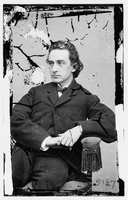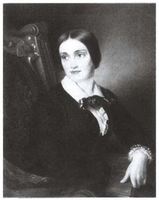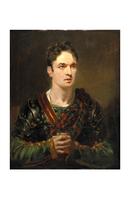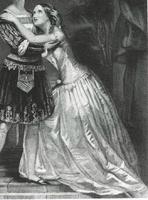Excerpts from Brander Matthews's Edwin Booth and His Contemporaries (1900)
Dublin Core
Title
Excerpts from Brander Matthews's Edwin Booth and His Contemporaries (1900)
Subject
Cushman, Charlotte Saunders, 1816-1876
Actors and Actresses
Booth, Edwin, 1833-1893
Macready, William Charles
Gossip--Published
Praise
Political Affairs
Finances
Gender Norms
Muspratt, Susan Cushman, 1822-1859
Description
Biographical sketch by Clara Erskine Clement with excerpts from articles and biographies
Credit
Source
Mathews, Brander, and Laurence Hutton, editors. Edwin Booth and His Contemporaries. Page, 1900.
Publisher
Page
Type
Reference
Auto/Biography Item Type Metadata
Text
Born Boston, July 23, 1816. First professional appearance, as a singer, in Boston, April, 1835. First appeared as an actress in the part of Lady Macbeth in New Orleans in the same year. First appeared in New York, and in the same part, Sept. 12, 1836. First visited England in 1844. First London appearance, as Bianca, Feb. 14, 1845. Returned to America, 1850. Again played in England in the summer of 1853. Played American engagements in 1857-8, 1860-1. First public reading, October, 1870. Last appearance in New York, Nov. 7, 1874. Last appearance in Boston, May 15, 1875. Last public appearance, as a reader, at Easton, Pa., June 2, 1875. Died in Boston, Feb. 18, 1876. [...]
Miss Cushman was accorded a high position as an actress in England. Macready fully recognized, and generously acknowledged her power. [...]
Charlotte Cushman was an ardent patriot, and during the War of the Rebellion she proved this in many ways ; she contributed to the Sanitary Commission $8,267, tne result of her earnings when she acted especially for the benefit of this charity. In her private life she was affectionate, even tender, having a singular fondness for children; she was also strong, and her friends turned to her for support and sympathy. She had a deep religious trust, and bore the sufferings of a long and painful illness with wonderful fortitude. In short, under all circumstances, as she expressed it, she " tried always to keep her prow turned towards good."
(137-141; written by Clara Erskine Clement)
Miss Cushman was accorded a high position as an actress in England. Macready fully recognized, and generously acknowledged her power. [...]
Charlotte Cushman was an ardent patriot, and during the War of the Rebellion she proved this in many ways ; she contributed to the Sanitary Commission $8,267, tne result of her earnings when she acted especially for the benefit of this charity. In her private life she was affectionate, even tender, having a singular fondness for children; she was also strong, and her friends turned to her for support and sympathy. She had a deep religious trust, and bore the sufferings of a long and painful illness with wonderful fortitude. In short, under all circumstances, as she expressed it, she " tried always to keep her prow turned towards good."
(137-141; written by Clara Erskine Clement)
The following anecdote illustrates Miss Cushman's decision and nerve. At the National Theatre, Boston, during the season of 1851-52, as she was playing Romeo to the Juliet of Miss Anderton, in the midst of one of the most romantic passages between the lovers, some person in the house sneezed in such a manner as to attract the attention of the whole audience, and every one new that the sneeze was artificial and deri sive. Miss Cushman instantly stopped the dialogue, and led Miss Anderton off the stage, as a cavalier might lead a lady from the place where an insult had been offered her. She then returned to the footlights and said in a clear, firm voice, " Some man must put that person out, or I shall be obliged to do it myself." The fellow was taken away; the audience rose en masse and gave three cheers for Miss Cushman, who recalled her companion and proceeded with the play as if nothing had happened
Clara Erskine Clement : ' Charlotte Cushman,' chap. 6, pp. 67-69.
(150)
Clara Erskine Clement : ' Charlotte Cushman,' chap. 6, pp. 67-69.
(150)
The younger generation of playgoers are only familiar with Miss Cushman's histrionic interpreta tions of Meg Merrilies, Lady Macbeth, and Queen Katharine. The recollection of these renderings will suffice to illustrate the foregoing summary, without further elaboration of detail. Miss Cushman is now mainly confining herself to the reading-desk. There can be no question that her peculiar intellectualism in art is shown even more in her readings than in her acting, notably so in the Shaksperean readings. In the dramas of Shakspere, the characters have so essential a play of relation, and are so subtile in their bearings on one another, that, unless they are all justly apprehended, the totality of the drama is maimed and marred. No genius on the part of Charlotte Cushman could prevent this on the stage. In the reading-desk she reigns as the sole magician, with the perfect opportunity to express the finest attainments of her thinking and culture. She has but to wave her wand to unlock from the prison-house of Shakspere's pages all the immortal phantoms that brood within them. It is for her alone to invest them with a splendid and subtile life. Miss Cushman's devotion to art remains unchanged. For many years she has been among those
Who live to be the show and gaze of the time.
That she may remain so for many years to come, and continue to illustrate her great dramatic conceptions, as none but she can, is the hope of thousands of admirers on both sides of the Atlantic.
George T. Ferris, in Appleton's Journal, March 21, 1874.
(150-151)
Who live to be the show and gaze of the time.
That she may remain so for many years to come, and continue to illustrate her great dramatic conceptions, as none but she can, is the hope of thousands of admirers on both sides of the Atlantic.
George T. Ferris, in Appleton's Journal, March 21, 1874.
(150-151)
Location
Boston, MA, US
Geocode (Latitude)
42.3602534
Geocode (Longitude)
-71.0582912
Provenance
Hathi Trust, https://hdl.handle.net/2027/njp.32101066164003. Accessed 2 April, 2020
Social Bookmarking
Geolocation
Collection
Citation
“Excerpts from Brander Matthews's Edwin Booth and His Contemporaries (1900),” Archival Gossip Collection, accessed April 18, 2024, https://www.archivalgossip.com/collection/items/show/275.






